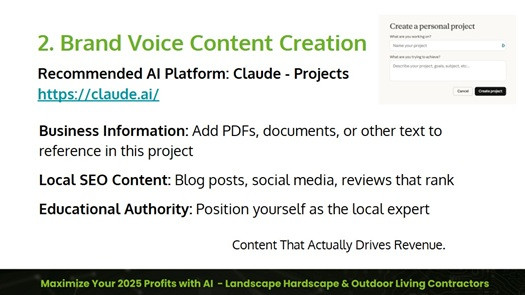How AI Can Help Your Business Achieve Higher Profits in 2025

While traditional marketing approaches consume significant time and resources, AI-powered solutions enable contractors to maximize 2025 Profits with AI by automating lead qualification, optimizing pricing strategies, and predicting market demand with unprecedented accuracy. AI analytics transform raw customer data into actionable insights, revealing peak service periods and identifying high-value prospects—predictive modeling forecasts seasonal demand fluctuations, allowing contractors to allocate resources strategically and maximize revenue opportunities. Intelligent pricing algorithms analyze competitor rates and local market conditions, ensuring competitive positioning while protecting profit margins. These automated systems free contractors from manual data analysis, enabling them to focus on core operations while AI drives consistent business growth and profitability improvements.
The landscape and hardscape contracting industry is facing unprecedented digital transformation, as platforms like Instagram, Facebook, and Google dominate client acquisition channels in 2025. Contractors must leverage advanced technology tools for personalized client engagement while developing distinct brand positioning strategies that cut through intensifying market competition. Success requires rapid adaptation to emerging digital trends and strategic repositioning based on real-time market data and client behavior analytics.
Digital Platform Dominance
Where will contractors find their next high-value clients in 2025? Digital platforms will dominate the landscape, fundamentally reshaping how contractors connect with prospects. Search engines, social media, and specialized contractor directories will capture 85% of customer research activities. Contractors who master digital marketing strategies will outperform competitors by 300% in lead generation. Online visibility isn't optional—it's survival. Google's algorithm updates favor businesses with strong local SEO, verified reviews, and mobile-optimized websites. Smart contractors are already shifting budgets from traditional advertising to targeted digital campaigns. Those who adapt quickly will secure premium projects while others struggle for scraps.
Technology-Driven Client Engagement
As contractors embrace sophisticated engagement tools, they're discovering that technology transforms every client interaction from initial contact through project completion. Advanced CRM systems now track client preferences, project histories, and communication patterns, enabling personalized service delivery. Real-time project updates through mobile apps keep clients informed, reducing anxiety and building trust. Digital portfolios showcase completed work instantly, while virtual consultations expand geographic reach. Automated client feedback collection systems capture satisfaction metrics immediately post-completion, providing valuable data for service improvements. Smart scheduling platforms eliminate back-and-forth communications, streamlining appointment booking. These engagement tools create seamless experiences that differentiate contractors in competitive markets.
Brand Differentiation Strategies

While technology enhances client engagement, successful contractors understand that lasting market position stems from distinctive brand positioning that competitors can't easily replicate. Strategic brand storytelling transforms routine services into compelling narratives that resonate with target audiences. Contractors must articulate their unique value proposition through specific project outcomes, specialized techniques, or exceptional client experiences. Data reveals that differentiated brands command 20% higher pricing premiums. Effective positioning requires identifying what makes services irreplaceable—whether it's sustainable practices, design innovation, or project delivery methods. Josh Blakeley's research shows contractors who establish clear brand differentiation achieve faster business growth and stronger client loyalty.
Competitive Market Positioning
Beyond establishing brand differentiation, contractors must actively position themselves within their competitive landscape to capture and defend market share. Successful positioning requires thorough market analysis to identify competitor strengths, weaknesses, and service gaps. Contractors should evaluate pricing structures, service offerings, and client satisfaction levels across their market segment. This data-driven approach reveals opportunities for competitive differentiation through specialized services, superior quality standards, or innovative project approaches. Smart positioning involves claiming specific market niches where competitors can't easily replicate expertise. By understanding their competitive environment, contractors can strategically communicate unique value propositions that resonate with target clients and establish sustainable market advantages.
Strategic Adaptation Requirements
Market dynamics in the contracting industry shift rapidly, demanding contractors implement systematic adaptation frameworks that respond to technological advances, consumer behavior changes, and economic fluctuations. Successful contractors establish quarterly review processes to analyze market trends and adjust their strategies accordingly. They monitor customer behavior patterns through digital analytics, tracking which services generate the highest demand and profitability. These contractors invest in flexible marketing systems that can pivot quickly when new opportunities emerge. They also maintain competitive intelligence programs to identify emerging threats and opportunities. Strategic adaptation requires data-driven decision-making processes that prioritize agility over rigid planning structures.
Next Steps: Preparing Your Business for AI-Driven Growth

As contractors face an increasingly competitive landscape, integrating AI-driven tools into their marketing operations isn't just an opportunity—it's becoming essential for sustainable growth. Smart AI implementation begins with automating lead qualification processes, enabling contractors to focus resources on high-value prospects. Business scalability accelerates when AI handles routine customer communications, scheduling, and follow-ups automatically.
Contractors should prioritize platforms that analyze customer data patterns, predict seasonal demand fluctuations, and optimize advertising spend across digital channels—starting with one AI tool—whether chatbots for websites or automated email sequences—allows businesses to measure ROI before systematically expanding their technology stack.




